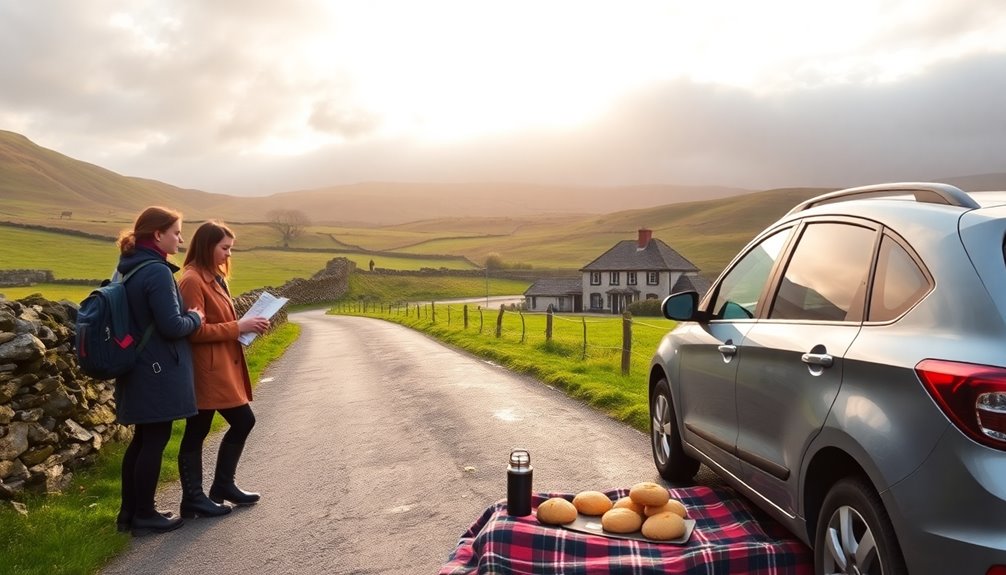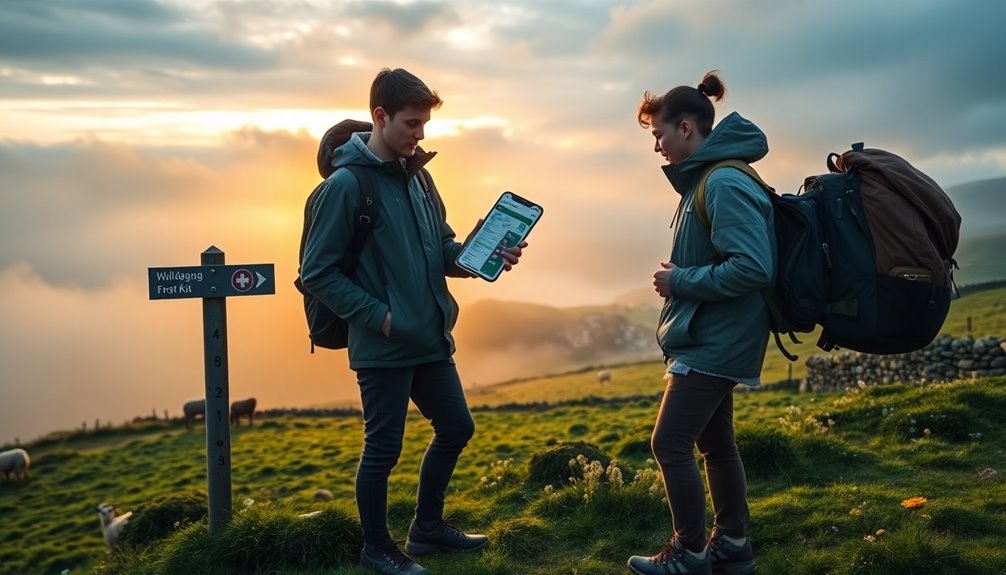
You can take restorative weekend trips to the Irish countryside without falling behind if you plan smart. Map your semester, book trips during natural gaps, and pick nearby highlights to minimize travel time. Budget for transport, lodging and food, pack layers and waterproofs, and choose flexible transport like a rental or key bus links. Block study sessions on the go and tell professors if needed. Keep safety and a small emergency buffer in mind — keep going to learn practical tips and examples.
Highlights
- Plan trips around your academic calendar and exam deadlines to avoid missed classes or heavy study weeks.
- Choose nearby destinations with short travel times to minimize lost study hours and maximize sightseeing.
- Create a simple budget covering transport, accommodation, food, activities, and a small emergency buffer.
- Pack lightweight layers, a waterproof jacket, quick-dry clothing, sturdy shoes, and a dry bag for electronics.
- Schedule firm study blocks during travel, use focused timers, and treat sightseeing as a reward between sessions.
Planning Short Breaks Around Class Schedules
If you’re juggling classes and want to squeeze in a weekend escape, start by mapping your academic calendar — note deadlines, exam weeks, and regular lab or tutorial times — so you can spot natural gaps for trips without stressing about missed work. You’ll cross-check your class schedule with travel times, picking nights that minimize lost contact hours. Build a compact trip itinerary that prioritizes nearby highlights and flexible returns. Communicate with professors when needed, pack study windows into travel, and choose transport with buffer times. That way you’ll keep momentum in school while claiming brief, liberating countryside breaks.
Budgeting for Weekend Getaways
Start by breaking your trip into essentials—transport, accommodation, food, and activities—so you can see where to cut costs. Look for simple savings like off-peak trains, local B&B deals, and cooking one meal at your rental. With a clear budget and a few smart swaps, you’ll stretch a weekend without missing the best sights.
Trip Cost Breakdown
A clear budget makes weekend trips to the Irish countryside easier to plan and less stressful, so you’ll want to break costs into a few simple categories: transport, accommodation, food and drink, activities, and a small emergency fund. Decide trip duration first — that shapes transport and lodging choices and helps estimate daily spend. For activities, list likely options and note activity costs so you won’t be surprised. Factor fuel or fares, shared stays or hostels, modest meals, and one paid attraction or guided walk. Keep an emergency buffer and a simple spreadsheet or note to track actual versus planned.
Saving While Traveling
When you’re planning weekend getaways in the Irish countryside, saving doesn’t mean skipping the fun — it means choosing smarter options that stretch your budget without shrinking your experience. You can hunt travel deals early, use student discounts, and pick flexible transport to save. Share a cottage with friends, cook breakfasts, then splurge on one memorable meal of local cuisine. Walk or bike instead of taxiing. Pack essentials to avoid impulse buys. Prioritize experiences that feel freeing: coastal walks, small festivals, pub music. Track spending with a simple app so you keep freedom without financial stress.
Best Transport Options for Countryside Trips

Though trains and buses can get you to many rural towns, you’ll often find renting a car gives you the most freedom for exploring the Irish countryside—especially if you want to reach off-the-beaten-path spots, change plans on the fly, or stop for views and pubs between villages. Balance private rentals with public transport: use buses and trains for key routes to save money, then hire a small car or van for flexibility. Check fuel, insurance, and local parking rules. Consider lift-sharing, local taxi apps, or bike hires for short stretches. Plan routes but stay ready to detour.
Packing Essentials for Variable Irish Weather
Because Ireland’s weather can flip from sun to squall in an hour, you’ll want a small, well-chosen kit that keeps you comfortable without weighing you down. Pack lightweight layers, a compact waterproof jacket, and weather proof clothing like breathable rain trousers and a windproof fleece. Choose quick-dry shirts and one warm mid-layer you can compress. Bring sturdy shoes with grip and a foldable hat or buff. Keep essential toiletries minimal: travel-size sunscreen, lip balm, biodegradable soap, and basic meds. Use a dry bag for electronics and a small daypack — freedom needs mobility, not a heavy suitcase.
Finding Student-Friendly Accommodation in Rural Areas
Looking for budget-friendly places to stay in the countryside? You’ll want hostel recommendations and rural retreats that match your pace: lively hostels near towns for social evenings, quiet B&Bs for focused downtime, and self-catered cottages when you crave independence. Book early for summer weekends, check transport links, and read recent reviews for safety and Wi‑Fi. Ask about laundry, kitchen access, and study-friendly corners. Consider volunteering stays or farmstays to cut costs and meet locals. Pack a compact lock and earplugs. Flexibility and simple planning let you enjoy freedom without breaking your student budget.
Balancing Study Time With Sightseeing
If you want to make the most of a countryside weekend without falling behind, plan a realistic study schedule before you go and slot sightseeing around firm study blocks. You’ll set study priorities—assigning must-dos and flexible tasks—so leisure doesn’t hijack progress. Use portable materials, timed sessions, and distraction-free spots at cafés or B&Bs. For sightseeing strategies, pick short routes and highlights near your base, and reserve longer excursions for evenings or a single free day. Keep sessions focused with timers, reward yourself with views, and stay flexible: a little structure gives you freedom to explore confidently.
Staying Safe and Healthy on Outdoor Excursions

When you head out into the Irish countryside, a little preparation goes a long way: check the weather and trail conditions, tell someone your route and expected return time, and pack basic safety gear like a charged phone, map, whistle, waterproof layers, water, and a small first-aid kit. You’ll want practical skills: read maps, use a compass or phone offline, and plan routes that match your fitness. Keep staying hydrated and snack regularly to maintain energy. Wear sturdy boots for uneven ground when traversing terrain, layer for sudden weather, and know basic first-aid. Stay curious, but respect limits.
Some Questions Answered
Can I Bring Friends Who Aren’t Students on a Weekend Trip?
Yes — you can usually bring non-student friends, but check friend eligibility and trip guidelines first. You’ll want to confirm spots, fees, and any ID or liability requirements before inviting them. If the trip’s limited or subsidized for students, priority might go to enrolled participants. Be ready to cover extra costs and follow safety and conduct rules. Communicate clearly so everyone’s on the same page and free to enjoy it.
Are There Discounts for Student Groups at Attractions?
Absolutely — many attractions offer student group discounts, but it varies by site: think of it as a treasure map where X marks special rates. You’ll want to check each attraction’s pricing policies ahead of time, ask about minimum group sizes, ID requirements, and booking windows. Call or email in advance, bring proof of student status, and negotiate group packages — you’ll often save money and get smoother entry for your crew.
What About Traveling With Musical Instruments or Sports Gear?
You can bring instruments and sports gear, but plan ahead: check transport rules, book extra space if needed, and pack sturdy cases. Travel tips: use soft covers for flights, bring straps or wheels for easy moves, and label everything. For overnight stays, ask hosts about instrument storage and safe spots for bikes. You’ll feel freer if you map gear-friendly routes and have simple repair kits and locks ready.
How Do I Handle Lost or Stolen Travel Documents Abroad?
When the chips are down, stay calm and act fast: report lost or stolen travel documents to local police, your embassy or consulate, and your accommodation. You’ll want copies of police reports and ID photos, notify your travel insurance and use emergency contacts back home to help wire funds or support. Get temporary travel papers from your consulate, keep digital copies securely, and consider registering with your embassy for extra assistance.
Can I Extend a Weekend Trip Into a Short-Term Internship Visit?
Yes — you can often extend a weekend into a short-term internship visit if you plan ahead. Check internship opportunities, visa or permit requirements, and travel logistics like accommodation, local transport, and how it affects your study commitments. Contact the host to confirm dates, ask about stipend or housing, and get written agreements. Stay flexible, keep emergency contacts handy, and book refundable travel so you can seize freedom without risking academic or legal trouble.
Summing Everything Up
You’ll find that planning weekend escapes around classes, budgets and unpredictable Irish weather becomes second nature — almost like bumping into a friendly local on a foggy lane who points you to a perfect trail. You’ll balance study and sightseeing by packing smart, choosing student-friendly stays, and using reliable transport. Those small coincidences — a canceled lecture, a spare bed, a sudden clear morning —’ll remind you that the best breaks fit into your life, not the other way round.
